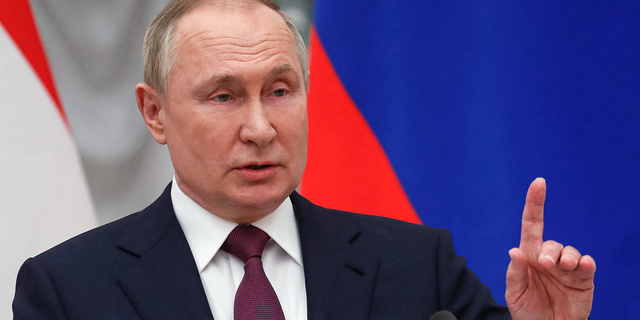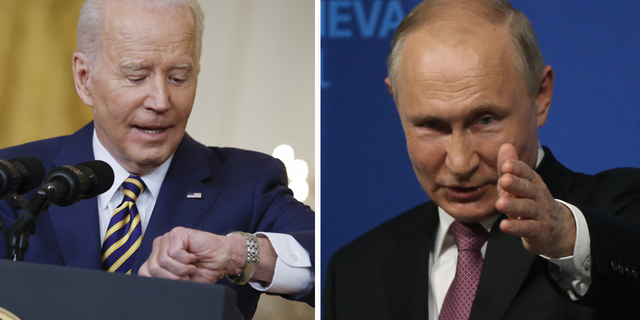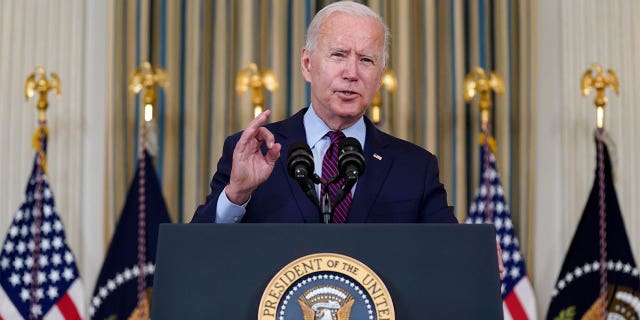by Michael Lee
The largest risk to an escalation of the conflict would be a no-fly zone enforced by NATO, experts say
Despite President Biden's promise not to involve U.S. troops in the war between Russia and Ukraine, a miscalculation from either side during the tense struggle could risk dragging NATO into the conflict.
The fear of a deadly escalation in the conflict has been at the center of the Biden administration's response in recent days, with the Pentagon last week denying a request from Ukraine to transfer Polish MiG-29 fighter jets to the country's armed forces through the U.S.'s Ramstein Air Base in Germany.

Slovakian Air Force Mig-29 Fulcrum
PUTIN MAINTAINS 95% OF AVAILABLE COMBAT POWER IN UKRAINE AS WAR PERSISTS: DOD OFFICIAL WARNS
"The intelligence community has assessed that the transfer of MiG-29s may be mistaken as escalatory and could result in significant Russian reaction that might increase the prospects of a military escalation with NATO," Pentagon Press Secretary John Kirby told reporters Wednesday. "Therefore, we also assess the MiG-29s to Ukraine to be high-risk."
But perhaps the largest risk to an escalation of the conflict would be a no-fly zone enforced by NATO, something Heritage Foundation Senior Research Fellow for Defense Policy John Venable told Fox News Digital would be an unlikely risk for NATO to take.
"The complications associated with establishing a no-fly zone are enormous and would involve more risk than NATO or the US would accept under almost any circumstance," Venable said.

Russian President Vladimir Putin (Yuri Kochetkov/Pool/Associated Press)
Author and former DIA intelligence officer Rebekah Koffler told Fox News Digital Thursday that a no-fly zone presents the most risk among known scenarios, but currently-unknown actions could inadvertently cause an escalation during the "fog of war."
"Usually the path of the escalation is difficult to predict, it can come out of nowhere in the fog of war," Koffler said.
Koffler argued that the current conflict in Ukraine is a "proxy war" between the U.S. and Russia that could easily escalate into a "shooting war."
"It is so easy for both sides to misinterpret each other's intentions," Koffler said.

Presidents Biden and Putin (Chip Somodevilla/Getty Images | Mikhail Svetlov/Getty Images)
She noted that Russia is already highly suspicious of the U.S. and even believes that a war between the two powers is "inevitable."
"The Russians are predisposed to worst-case scenario, their intelligence assessments say that a war between the U.S. and Russia is inevitable, they already believe it," Koffler said.
Koffler argued that any number of steps the U.S. may take in Ukraine could be interpreted by the Russians as escalatory, noting that Russian intelligence agencies rely on an algorithm with multiple inputs to assess what their adversary's next move might be. That means even small steps taken by the U.S. could be seen as a preparation for war.
Russian military doctrine would then call for the Kremlin to strike the first blow in an attempt to gain the strategic advantage, Koffler noted, adding that the Russians are aware their forces are incapable of competing with U.S. troops in a conventional conflict.

President Joe Biden (AP Photo/Evan Vucci)
Some of Russia's paranoia about the U.S. stems from previous American military operations, Koffler said, including the 2003 invasion of Iraq that toppled the regime of Saddam Hussein.
"They have assessed that the United States is a high-risk adversary because we routinely conduct military operations to topple regimes such as Saddam," Koffler said.
Venable believes the best way to avoid a military conflict is to keep applying pressure on Russia to pull its forces out of Ukraine, arguing that Russia losing the war could actually cause them to escalate the situation further.
"If Putin continues to get boxed in through sanctions, trading and banking stoppages -- and he starts losing the war, that may be reason enough for him to employ tactical nuclear weapons," Venable told Fox News Digital. "The West needs to continue to apply pressure, attempt to broker a settlement/cease-fire while continuing to offer off-ramps that deescalate the potential" for a conflict between NATO and Russia.
Michael Lee is a writer at Fox News. Follow him on Twitter @UAMichaelLee
Source: https://www.foxnews.com/politics/how-miscalculations-and-misperceptions-could-lead-to-us-russia-conflict
No comments:
Post a Comment